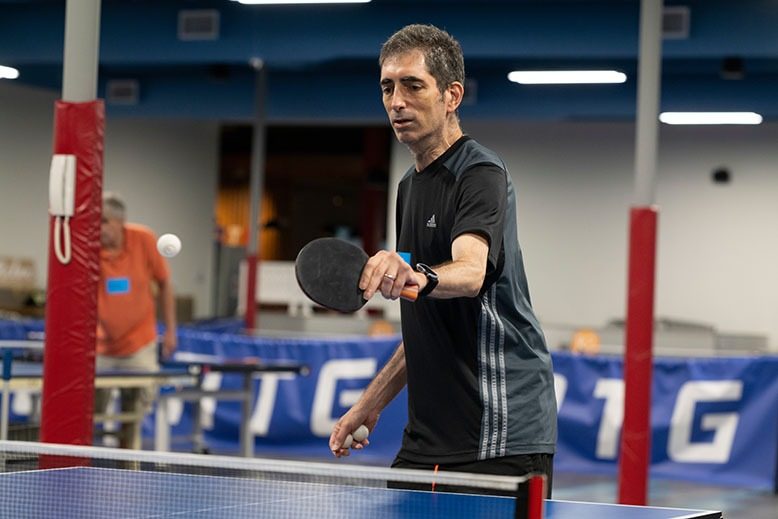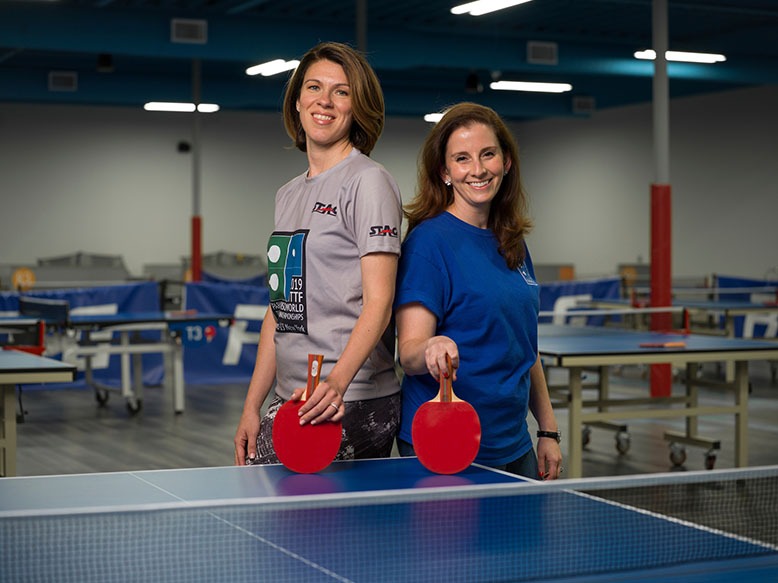
It’s Tuesday night at the Ready to Golf sports center in River Edge, and in the table-tennis room, the thump of piped-in disco mingles with the rhythmic pops of little plastic balls, creating a din that’s surprisingly cheerful. It’s certainly no deterrent to the dozen or so men and women who’ve come together this evening to have some fun and hone their Ping-Pong chops. The folks with the blue name tags have also come to face down a common adversary: Parkinson’s disease.
Watching the players, though, you’d be hard-pressed to distinguish between those with Parkinson’s and those without, except for their name tags (volunteers wear red). There’s something about the game that tames the uncontrollable body movements that characterize the disease and helps clear the mental fog that sometimes accompanies it.
In fact, Ping-Pong does more than offer a temporary reprieve from symptoms; it can apparently actually halt the progression of the disease. That, essentially, is the idea behind PingPongParkinson, a nonprofit founded in 2017 by Nenad Bach, a musician who’s performed with the likes of Luciano Pavarotti and Bruce Springsteen, and who himself suffers from Parkinson’s. When a friend invited Bach to a game of table tennis, he discovered that playing improved both his mood and his motor-skill symptoms—a find he deemed worth sharing.
The first PingPongParkinson site opened in 2017 in Pleasantville, New York. Soon after, Bach’s friend Elizabeth Kera, a neuropsychologist at Hackensack Medical Center, suggested he bring the organization to New Jersey, and in early 2020, PingPongParkinson opened at a facility in Westwood. The pandemic shuttered the charity and the facility, the latter permanently, so in March, PingPongParkinson reopened in its current location in River Edge. Other United States locations can be found at pingpod.com and wearespin.com.
Ping-Pong isn’t the only activity that ameliorates the symptoms of Parkinson’s, which can include tremor, rigidity, slowed movement, impaired posture and balance, and changes in speech and writing. “Any physical activity that’s challenging, nuanced, and pushes a patient to work on something that doesn’t come naturally helps prolong the life span of dopamine-producing cells in the brain,” says Elena Clar, a movement-disorders neurologist at the New Jersey Brain and Spine Center and, like Kera, a member of PingPongParkinson’s advisory board. Parkinson’s attacks those cells, which help regulate heart rate, attention, movement and mood.

Elizabeth Kera, left, and Elena Clar. Photo by John Emerson
What makes Ping-Pong so beneficial for people with Parkinson’s, Kera explains, is that, in addition to drawing on a wide range of motor skills, like hand-eye coordination and reaction time, it also exercises cognitive abilities that can be affected by the disease. “Pongers”—the organization’s term for players with Parkinson’s—“are working on visual scanning, visual tension and problem-solving,” she says. “There’s a lot of strategy involved: You might spin the ball or hit it on the side.” It’s also social—a boon to a population that may feel increasingly isolated as the disease progresses.
Like many people with Parkinson’s, Cresskill resident David Falk attends physical therapy, but finds it “regimented,” whereas Ping-Pong is pleasurable and social in nature. As we speak, the paddle in his hand shakes slightly. But “my hands aren’t as shaky when I’m playing, and I’m more focused,” he says.
For Andy Lieb, a ponger from Paramus, focus is key. “If my mind isn’t on myself but on a task,” he says, “I move much more freely.” Both Falk and Lieb are PingPongParkinson regulars, two of the 20 to 30 pongers who usually show up on Tuesday nights. “Parkinson’s makes you small,” Falk explains. “This,” he says, gesturing at the spirited games going on around him, “makes you a little bit bigger.”



